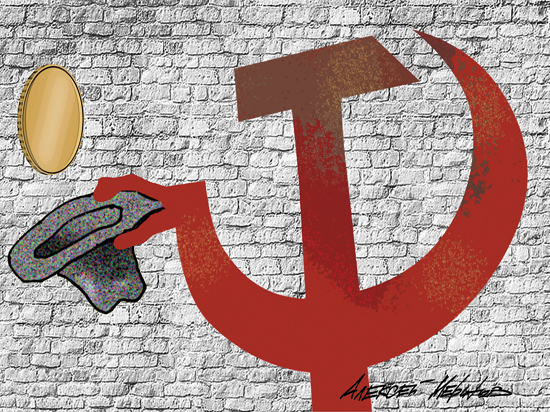Russia faces becoming North Korea, not the Soviet Union
Russian Marxist Bolsheviks have come up with their own unique way of overcoming poverty. In order for a person not to have a feeling of poverty, it is simply necessary to remove the rich and successful from the country, or even better – to turn the poor into a starving person and send him to the next world. The Soviet worker was happy that on holidays twice a year he got the opportunity to buy one loaf of dry sausage and a jar of caviar. During the Holodomor of 1932-1933, there were 6 million fewer needy peasants in the USSR.

Photo: Alexey Merinov
And, I think, from a political point of view, the leadership of the Communist Party made the right decision: its nuclear electorate does not need any social democracy, no welfare state with a capitalist economy. The nuclear electorate of the Communist Party dreams of returning to the days of Stalin’s “strong power”. What kind of social democratisation of the Communist Party can we talk about when “Russia is not the West”? By the way, the current government, which after the “Russian spring” of 2014 turned Russia intoThe “besieged fortress” declared it the antipode of European values, thereby clearing the ideological and social ground for the growth of the popularity of the Communist Party and the rehabilitation of Stalin. And that is why today criticism of the Soviet Union is already perceived as national treason. Of course, today the implementation of the Communist Party’s plans to return to Leninist-Stalinist socialism seems unlikely. But do not forget that we live in a country where the most impossible very often becomes real.
That is why, in my opinion, it is important today to see the truth about the reasons for the defeat of the anti-communist revolution in the USSR, which was launched during perestroika, it is important to find out why, the further we move away from 1991, from the collapse of the Soviet system, the faster the nostalgia for the lost Soviet Union grows in the Russian people. However, people who sympathize with the Communist Party today do not realize that the implementation of its program actually means turning our country into North Korea, into a country,where the zombification of the population by the communist government has acquired a monstrous character. The communist government in North Korea did to its population what Stalin did to the Soviet people in the 1930s. Then there was nothing left in a person of personal dignity. And now everything human is being killed in North Korea. North Korea is just the ideal embodiment of the “Leninist-Stalinist socialism”, which the leaders of the Communist Party are talking about today.
The first and main reason for the growth of pro-Soviet sentiments, even hopes for the restoration of Leninist-Stalinist socialism, in my opinion, is that in the USSR, and in particular in the former RSFSR, unlike the countries of Eastern Europe, there was no anti-communist revolution in the exact sense of the word. If in the countries of Eastern Europe the “velvet revolutions” of 1989 were both anti-Soviet and anti-communist, then our August revolution of 1991, which we call “democratic”, was actually “anti-apparatus”. And inin this sense, not anti-, but pro-communist. The August revolution of 1991 was primarily driven by a thirst for equality, a desire to end the privileges of the hated communist nomenklatura. How did Yeltsin gain popularity among the population of the RSFSR? The fact that he stopped riding in special vehicles, and moved by trolleybus and subway. The August 1991 democratic revolution could not have been anti-communist, because neither among the leaders of “Democratic Russia” nor in Yeltsin’s team was there a single convinced anti-Marxist and anti-communist.
Why did I remember that? In order to show that pro-communist sentiments, especially since the beginning of the “zero”, began to die due to the fact that Yeltsin’s successor Vladimir Putin intercepted and tried to implement the ideology of the Communist Party of the mid-1990s. Of course, the privatization of the 1990s, which led to the transfer of the entire national heritage into the hands of several oligarchs, has always been a time bomb, including in the “zero”. But thanks to the fact that Putin managed to raise the welfare of the population, began to pay pensions without delay, raised the salary level by two withhalf the time, these anti-oligarchic sentiments somehow subsided, ceased to be a factor in big politics. But the “Russian spring” of 2014, which led to a gradual decline in living standards, to an increase in poverty of the population, gave the Communist Party a chance to return to active politics. Of course, in my opinion, only people without a sense of conscience can tempt a Russian person to return to Leninist-Stalinist socialism. But in conditions of growing poverty, despair is growing, and for a poor person there is no difference between the poverty of supposedly democratic Russia and life in Leninist-Stalinist socialism.

